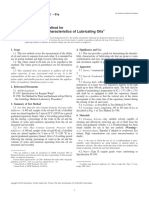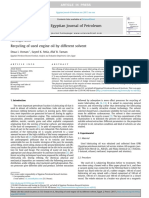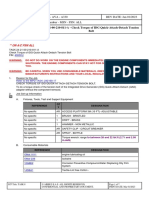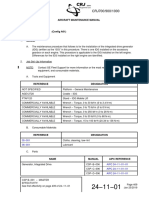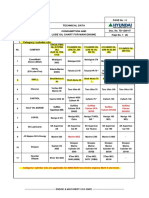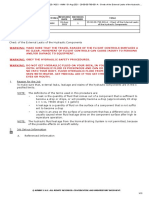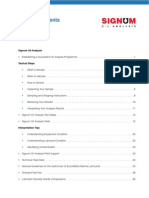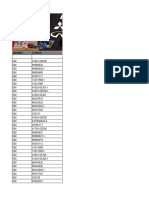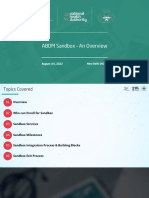Diesel Fuel Contamination and Fuel Filter Plugging: Technical Service Bulletin 95-1R2
Diesel Fuel Contamination and Fuel Filter Plugging: Technical Service Bulletin 95-1R2
Uploaded by
KannahFreiAbenGuzmanCopyright:
Available Formats
Diesel Fuel Contamination and Fuel Filter Plugging: Technical Service Bulletin 95-1R2
Diesel Fuel Contamination and Fuel Filter Plugging: Technical Service Bulletin 95-1R2
Uploaded by
KannahFreiAbenGuzmanOriginal Description:
Original Title
Copyright
Available Formats
Share this document
Did you find this document useful?
Is this content inappropriate?
Copyright:
Available Formats
Diesel Fuel Contamination and Fuel Filter Plugging: Technical Service Bulletin 95-1R2
Diesel Fuel Contamination and Fuel Filter Plugging: Technical Service Bulletin 95-1R2
Uploaded by
KannahFreiAbenGuzmanCopyright:
Available Formats
Technical Service Bulletin 95-1R2
Diesel Fuel Contamination and Fuel Filter
Plugging
Fuel contamination is a fact of life. Preventing problems and equipment damage
associated with contaminated fuel is primarily the responsibility of the end user.
These responsibilities include the proper and timely replacement and servicing of
the filters; selection of the fuel source, grade, and blend; and use of heaters,
separators, and additives as required. (Refer to TSB 07-1 and TSB 07-2)
Fuel filters capture unwanted contaminants from the fuel. Left unchecked, these
contaminants may cause serious and expensive damage to many system
components including pumps, lines, and injectors. Fuel contaminants have many
sources. Most sources are external to the fuel system itself, that is, most
contaminants come with the fuel that is delivered to the fuel tank. As it comes
from the refinery, diesel fuel is generally clean. Contaminants in diesel fuel are
typically introduced in fuel storage systems through mixing, transferring, and
storage.
Fuel filters, by design, become more restrictive to the flow of fuel as they go
about their job of removing contaminants from the fuel system. Fuel systems,
unlike lube systems, do not have the opportunity for bypass flow and
consequently, as flow through the fuel filter becomes severely restricted or
plugged, loss of engine power will result. A thorough investigation of the filter and
the fuel source should be conducted anytime a fuel filter is suspected of
delivering less than its expected life.
Some common contaminants found in today's fuels might include:
Water -- is the greatest concern because it is the most common form of
contaminant. Water may be introduced into the fuel supply during fueling when
warm, moisture laden air condenses on the cold metal walls of fuel storage tanks
or from poor housekeeping practices. The effects of water in diesel fuel can be
serious. Water can cause damage to injector components and reduce the
lubricity of the fuel which can cause seizure of close tolerance components such
as those found in fuel pump assemblies.
Revised October 2007
Page 1 of 3
Water can be removed from diesel fuel by using in-line water separating filters or
devices. Long term prevention of problems associated with water in fuel is best
accomplished by obtaining fuel from reputable suppliers capable of providing
high quality fuel. Further, tanks should be kept as full as possible to prevent
condensation. Fuel should be drawn from the top of a storage tank if possible,
as water is heavier than diesel fuel and tends to settle to the bottom of tanks.
Tanks can also be kept free of water with continuous off-line or "kidney-loop"
filtration/separation.
Fungus and Bacteria -- live in water and feed on the hydrocarbons found in fuel.
Often called Humbugs for short, these active and multiplying colonies will spread
throughout a fuel system and quickly plug a fuel filter. The fuel filter will have a
slime-like coating over the surface of the media, dramatically reducing the
service life of the filter. Bacteria may be any color, but are usually black, green or
brown. Draining the system will reduce microbial activity, but will not eliminate it.
The only way to eliminate microbial growth once it has started is to clean and
treat the system with a biocide.
Wax -- is desirable as a source of energy in fuel, but control in cold weather
operation is needed. Wax crystals form as a result of cold temperature
precipitation of paraffin. Temperatures below a fuel's cloud point will result in wax
precipitation and filter plugging. To prevent plugged filters due to wax formation,
the cloud point of fuel must be at least +12° Celsius (+22°F) below the lowest
outside temperature. Fuel suppliers blend diesel fuel based on local anticipated
cold weather conditions. Particular attention should be given to diesel fuel
purchased outside your local area. For example, fuel purchased in the West or
South may not be suitable for operating conditions in the Midwest or North.
Asphaltenes -- are by-products of fuel as it oxidizes. Asphaltene particles are
generally thought to be in the 0.5 – 2.0 micron range and are harmless to the
injection system, as they are soft and deformable. As these tiny particles pass
through the filter media they tend to stick to the individual fibers. If you were to
cut open a filter that had choked after a normal service interval you would see a
black, tarry substance on the dirty side of the element; this is asphaltene
(oxidized fuel). Fuel with a high percentage of asphaltenes will drastically shorten
the life of a fuel filter.
Sediment and other solids -- often get into fuel tanks and can cause problems.
Most sediment can be removed by settling or filtration. Fuel filters designed for
specific applications will remove these contaminants before they cause fuel
system damage.
Revised October 2007
Page 2 of 3
In no case should a less efficient filter be substituted to fix a perceived problem
with premature plugging. Plugged filters will develop as the filter works to remove
unwanted contaminants from the fuel system. Filter manufacturers design fuel
filters to provide the level of filtration protection specified or required by the OEM
manufacturer. Substitution of a less efficient filter may prolong a filter's life before
plugging occurs, but it will also allow contaminants to pass downstream which
will eventually impact the life of other, more expensive fuel system components.
(Refer to TSB 89-5R3)
Clean fuel is essential for efficient, optimum engine performance. Remember,
newly refined fuel is generally clean. Between the time the fuel leaves the
refinery and enters the engine's fuel tanks, it should be handled carefully to avoid
possible contamination that can prematurely plug fuel filters and cause even
further, more serious damage within the engine's fuel system.
For additional information, contact:
Filter Manufacturers Council
P.O. Box 13966
Research Triangle Park, NC 27709-3966
Phone: 919/549-4800 Fax: 919/406-1306
www.filtercouncil.org
Administered by Motor & Equipment Manufacturers Association
Revised October 2007
Page 3 of 3
You might also like
- CEFIC AUS32 DEF Quality Assurance GuidanceDocument21 pagesCEFIC AUS32 DEF Quality Assurance GuidanceElisebarreNo ratings yet
- IOE425 Syllabus Winter 2017 002 v1.1Document7 pagesIOE425 Syllabus Winter 2017 002 v1.1jstnjoseNo ratings yet
- SITHCCC008 Assessment 1 - PortfolioDocument18 pagesSITHCCC008 Assessment 1 - Portfolioajay64% (14)
- Fluid Analysis for Mobile Equipment: Condition Monitoring and MaintenanceFrom EverandFluid Analysis for Mobile Equipment: Condition Monitoring and MaintenanceNo ratings yet
- A T A 2 9 PDFDocument36 pagesA T A 2 9 PDFozaozaozaNo ratings yet
- AdBlue Flyer DaimlerDocument2 pagesAdBlue Flyer DaimlerAngelAdrianMartinezAlvarezNo ratings yet
- Fully-Formulated Glycol Base Engine Coolant For Heavy-Duty EnginesDocument4 pagesFully-Formulated Glycol Base Engine Coolant For Heavy-Duty EnginesVladimirNo ratings yet
- 12B OilAnalysisDocument2 pages12B OilAnalysisMuhamad BadarNo ratings yet
- Water Soluble Cutting Oil Mobilcut SeriesDocument2 pagesWater Soluble Cutting Oil Mobilcut SeriesAxel Mahya AvichenaNo ratings yet
- Design Engineer's Guide - Selecting A Lubricant For Ball ScrewsDocument10 pagesDesign Engineer's Guide - Selecting A Lubricant For Ball ScrewsDat RomanNo ratings yet
- CUMMINS-a-avantgarde Prof m5 10w-40 Cummins 16.02.2016 Eng NocDocument3 pagesCUMMINS-a-avantgarde Prof m5 10w-40 Cummins 16.02.2016 Eng NocМаркоNo ratings yet
- AMM August 2020 12-13-79-610-003-C - Oil Tank DrainingDocument5 pagesAMM August 2020 12-13-79-610-003-C - Oil Tank DrainingIrfan05No ratings yet
- Astm D 2711Document8 pagesAstm D 2711aleiviNo ratings yet
- Presentation 11 16 05Document54 pagesPresentation 11 16 05dh6802100% (1)
- MCE321 - Lubrication and LubricantsDocument9 pagesMCE321 - Lubrication and LubricantsVanina VaniniNo ratings yet
- 60 Question For Lube SuppliersDocument12 pages60 Question For Lube SuppliershungNo ratings yet
- Especificaciones Caterpillar para Aceite Motores DieselDocument2 pagesEspecificaciones Caterpillar para Aceite Motores DieselADRIAN MENDEZ RICARIO100% (1)
- Abs Afp M8 M9 O&m enDocument44 pagesAbs Afp M8 M9 O&m enignacioramirezNo ratings yet
- Sleeve or Plain Bearing LubricationDocument3 pagesSleeve or Plain Bearing LubricationVolety_Sarma_1703100% (1)
- MMH Dan StoringDocument13 pagesMMH Dan Storingfilza100% (1)
- Coolant Requirement ASTMDocument5 pagesCoolant Requirement ASTMjeganNo ratings yet
- Din 70070Document1 pageDin 70070Ale TorossianNo ratings yet
- Jenbacher: 1. Range of ApplicationDocument1 pageJenbacher: 1. Range of ApplicationArîfNo ratings yet
- Coolant Specification253 - 73FEB-2009Document10 pagesCoolant Specification253 - 73FEB-2009Purchase and Stores Officer Contract Cell-IINo ratings yet
- Compressor Lubrication Best PracticesDocument5 pagesCompressor Lubrication Best PracticeslubangjarumNo ratings yet
- Lubricant Base OilsDocument3 pagesLubricant Base OilssinhleprovietNo ratings yet
- Hydraulic Fluids in Mobile Application Re98128 - 2015-06 - Online PDFDocument13 pagesHydraulic Fluids in Mobile Application Re98128 - 2015-06 - Online PDFDennis Huanuco CcamaNo ratings yet
- Oil Grades For BearingDynamic ViscosityDocument2 pagesOil Grades For BearingDynamic Viscositypurnendraj4979No ratings yet
- Jenbacher: 1. Engine Oil: - 1Document5 pagesJenbacher: 1. Engine Oil: - 1Arîf100% (1)
- Seepex Om BN 2009Document115 pagesSeepex Om BN 2009royert80No ratings yet
- Eaton Internormen Condition Monitoring SystemsDocument16 pagesEaton Internormen Condition Monitoring SystemsEaton FiltrationNo ratings yet
- Lubricant OilDocument5 pagesLubricant OilFahad HussainNo ratings yet
- 24-21-00-210-811-A - Check Torque of IDG Quick-Attach-Detach Tension BoltDocument7 pages24-21-00-210-811-A - Check Torque of IDG Quick-Attach-Detach Tension BoltHarold Boya AncichoNo ratings yet
- Aircraft Maintenance ManualDocument10 pagesAircraft Maintenance ManualPPC LINE9No ratings yet
- Fluitec SKF Elgi2001Document8 pagesFluitec SKF Elgi2001api-221802169No ratings yet
- Propac: Flushing Procedure For Hydraulic Piping, Tubing & HoseDocument4 pagesPropac: Flushing Procedure For Hydraulic Piping, Tubing & HoseClaudio Hernández PobleteNo ratings yet
- Grease BasicsDocument5 pagesGrease Basicsmarcalasan100% (1)
- (Components) (Engine) (319092113) (221281) (Kia Ceed 1.6CRDi Engine Capacities and Engine Oil)Document8 pages(Components) (Engine) (319092113) (221281) (Kia Ceed 1.6CRDi Engine Capacities and Engine Oil)Alin GrigorescuNo ratings yet
- Fuel DilutionDocument18 pagesFuel DilutionMuHaZir0% (1)
- Aircrafft Lubrication SystemDocument8 pagesAircrafft Lubrication SystemshyamsundarsrNo ratings yet
- 1-主机油料资料TD-1200-47-LO Chart included in technical data (approval drawing)Document7 pages1-主机油料资料TD-1200-47-LO Chart included in technical data (approval drawing)Aaron ChanNo ratings yet
- Ruler - Technology: Remaining Useful Life Evaluation RoutineDocument6 pagesRuler - Technology: Remaining Useful Life Evaluation RoutineLord Krsnik100% (1)
- How To Flush Gearboxes and Bearing Housings: Noria CorporationDocument6 pagesHow To Flush Gearboxes and Bearing Housings: Noria CorporationiagoramonNo ratings yet
- Lubrication Chart For UCPL ProjectDocument8 pagesLubrication Chart For UCPL ProjectvinodsnNo ratings yet
- IAD - A318 - A319 - A320 - A321 - AMM - 01-Aug-2021 - 29-00-00-790-001-A - Check of The External Leaks of The Hydraulic ComponentsDocument12 pagesIAD - A318 - A319 - A320 - A321 - AMM - 01-Aug-2021 - 29-00-00-790-001-A - Check of The External Leaks of The Hydraulic ComponentsMONOJ ANo ratings yet
- List of Products Related To Danieli Standard 0.000.001 - Rev.15Document11 pagesList of Products Related To Danieli Standard 0.000.001 - Rev.15cotteNo ratings yet
- Basic of Lubricant and Lubrication-2Document34 pagesBasic of Lubricant and Lubrication-2Dhanie EndaNo ratings yet
- AMM - IGO - A318/A319/A320/A321 REV DATE: Aug 01/2021 Tail Number - MSN - FSN: ALLDocument23 pagesAMM - IGO - A318/A319/A320/A321 REV DATE: Aug 01/2021 Tail Number - MSN - FSN: ALLRameswar PradhanNo ratings yet
- LubricationDocument49 pagesLubricationAdel KlkNo ratings yet
- CENT Condition Monitoring PresentationDocument28 pagesCENT Condition Monitoring Presentationmkpq100% (1)
- Signum-Technical-Guide LO SAMPLING GUIDEDocument30 pagesSignum-Technical-Guide LO SAMPLING GUIDEshirishkv100% (1)
- Top 20 Basic Car Maintenance Tips For Longer Life of Your CarDocument8 pagesTop 20 Basic Car Maintenance Tips For Longer Life of Your CarYogesh ShindeNo ratings yet
- Ti 1000 0200 - enDocument2 pagesTi 1000 0200 - enJamil Ahmed100% (1)
- ISO 6743-15 - 2007 - Part. 15 - Family E - Internal Combustion Engine OilsDocument9 pagesISO 6743-15 - 2007 - Part. 15 - Family E - Internal Combustion Engine OilsMassimiliano VolaNo ratings yet
- Lubricants For RailwaysDocument9 pagesLubricants For RailwaysMukesh BoroleNo ratings yet
- Glycol in Lubricating Oil - Detection, Analysis and RemovalDocument8 pagesGlycol in Lubricating Oil - Detection, Analysis and RemovalFranco PorrasNo ratings yet
- ISO 6743-14 - 1994 - Part. 14 - Family U - Heat TreatmentDocument8 pagesISO 6743-14 - 1994 - Part. 14 - Family U - Heat TreatmentMassimiliano VolaNo ratings yet
- Wear: Materials, Mechanisms and PracticeFrom EverandWear: Materials, Mechanisms and PracticeGwidon W. StachowiakNo ratings yet
- Machine Reliability and Condition Monitoring: A Comprehensive Guide to Predictive Maintenance PlanningFrom EverandMachine Reliability and Condition Monitoring: A Comprehensive Guide to Predictive Maintenance PlanningRating: 4.5 out of 5 stars4.5/5 (2)
- The Death of Reliability: Is it Too Late to Resurrect the Last, True Competitive Advantage?From EverandThe Death of Reliability: Is it Too Late to Resurrect the Last, True Competitive Advantage?No ratings yet
- Diesel Fuel Contamination and Fuel Filter Plugging: Technical Service Bulletin 95-1Document3 pagesDiesel Fuel Contamination and Fuel Filter Plugging: Technical Service Bulletin 95-1Prabu ArNo ratings yet
- EFX-MKVI Manual 10xeDocument36 pagesEFX-MKVI Manual 10xeBruno De OliveiraNo ratings yet
- 5s Audit ChecklistDocument2 pages5s Audit ChecklistPhương ThảoNo ratings yet
- Attachment 10.2Document1 pageAttachment 10.2jiks_i4uNo ratings yet
- INTERNAL MEMORY Ram/romDocument10 pagesINTERNAL MEMORY Ram/romRon NokwareNo ratings yet
- Adv. Fin. Acct Test-2Document4 pagesAdv. Fin. Acct Test-2Samuel DebebeNo ratings yet
- Math Scielympics Ppa 2024Document11 pagesMath Scielympics Ppa 2024Sheryll BayyaNo ratings yet
- SUNILDocument2 pagesSUNILVinod RanjanNo ratings yet
- COOP-Price List For Phone LCD With Logo11 2023.2.20)Document716 pagesCOOP-Price List For Phone LCD With Logo11 2023.2.20)Miguel YubiNo ratings yet
- Electricity 7 - Potential Difference RulesDocument29 pagesElectricity 7 - Potential Difference RulesMark ReeveNo ratings yet
- WEB SCRAPING - Resturant Detail in CanadaDocument4 pagesWEB SCRAPING - Resturant Detail in Canadaaonmuhammad530No ratings yet
- 05 Exercise Solutions - e PDFDocument15 pages05 Exercise Solutions - e PDFTsz Yan LamNo ratings yet
- Notional LoadDocument4 pagesNotional LoadThirupathi RajaNo ratings yet
- MDN 1406DGDocument96 pagesMDN 1406DGgeo_prizm1990No ratings yet
- Lista de Precios Actualizada 15-01-2024Document87 pagesLista de Precios Actualizada 15-01-2024WINDERNo ratings yet
- A Study On Customer Satisfaction at CielDocument87 pagesA Study On Customer Satisfaction at Cielganesh rajNo ratings yet
- Kec International Limited: Hazard Identification & Risk Assessment For T & D DIVSIONDocument1 pageKec International Limited: Hazard Identification & Risk Assessment For T & D DIVSIONTwin BullsNo ratings yet
- May 2018 SGV SDGSDDocument26 pagesMay 2018 SGV SDGSDBien Bowie A. CortezNo ratings yet
- CV Divino Edgar Lacambra (Petrofac) - Cost Control ManagerDocument5 pagesCV Divino Edgar Lacambra (Petrofac) - Cost Control Managerjuandlc3368No ratings yet
- QA For Private SecurityDocument63 pagesQA For Private SecurityJacob100% (1)
- Chap1 B StatDocument15 pagesChap1 B Statamare mitkuNo ratings yet
- EV Drag Coefficients Aim For TDocument2 pagesEV Drag Coefficients Aim For Tfangs997No ratings yet
- Group Members:: Ambily.J.Xavier Alka.G.Pillai Naveen Anil Browny Jinu PrakashDocument51 pagesGroup Members:: Ambily.J.Xavier Alka.G.Pillai Naveen Anil Browny Jinu PrakashNaveenAnilNo ratings yet
- The Cubli: A Reaction Wheel Based 3D Inverted PendulumDocument7 pagesThe Cubli: A Reaction Wheel Based 3D Inverted Pendulumbula69No ratings yet
- Floating Roof Tank ProcedureDocument7 pagesFloating Roof Tank ProcedureNithin GNo ratings yet
- Sehh2042 Sehs2042 GP Instruction 2425s1Document10 pagesSehh2042 Sehs2042 GP Instruction 2425s1jimminecraft66No ratings yet
- MX3G PLC HMI All in One Programming Manual-1Document22 pagesMX3G PLC HMI All in One Programming Manual-1adaoNo ratings yet
- Sandbox v3 694c0f6ee0Document16 pagesSandbox v3 694c0f6ee0hitrerognaNo ratings yet
- Integrated Report Fy2021Document114 pagesIntegrated Report Fy2021Raghav SawhneyNo ratings yet












